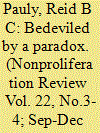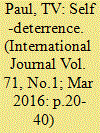| Srl | Item |
| 1 |
ID:
144291


|
|
|
|
|
| Summary/Abstract |
This article explores how two influential American policy makers—Paul Nitze and McGeorge Bundy—wrestled with the idea of a norm against the use of nuclear weapons. Existing scholarship has overlooked how both Bundy and Nitze came to understand the idea of nuclear non-use, especially related to the credibility of threats to use nuclear weapons. Using documentary evidence from their personal papers, this article illuminates the thinking of Bundy and Nitze, finding that both engaged with the idea of a norm of non-use of nuclear weapons in their strategic writing and thought.
|
|
|
|
|
|
|
|
|
|
|
|
|
|
|
|
| 2 |
ID:
143518


|
|
|
|
|
| Summary/Abstract |
In this article I argue that it is much harder to deter and compel non-nuclear states and terrorist groups through the threat of use of nuclear weapons than proponents of nuclear use contend. A counter-proliferation strategy relying on nuclear threat and preventive war has serious limitations and may well be a source of nuclear proliferation rather than non-proliferation. While the fear of a retaliatory attack constrains a nuclear state from using its nuclear weapons against another nuclear state, a nuclear state may not be able to mount and execute a nuclear retaliatory strike against a non-nuclear state or a non-state actor for reasons beyond military calculations. The nuclear state could be restrained by self-imposed reputational concerns arising from moral, legal, and other normative considerations. This form of restraint can be aptly termed “self-deterrence.” This article first elaborates the concept of self-deterrence and then explores the core reasons for its prevalence. There may be multiple reasons for self-deterrence, including domestic politics, bureaucratic politics, and leaders’ psychology, especially in terms of risk aversion. However, in light of the historical record—especially instances from US nuclear history—reputational considerations appear to be crucial in explaining self-deterrence. These reputational considerations derive largely from three sources: the tradition of non-use of nuclear weapons, moral restraints, and legal principles regarding the use of nuclear weapons. I conclude by arguing that deterrence theory and policy need to take into account this aspect of self-deterrence along with cultural, psychological, and domestic-level constraints that have been presented as challenges to that theory’s premises and applicability.
|
|
|
|
|
|
|
|
|
|
|
|
|
|
|
|